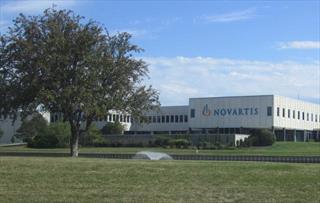
Photo by Kayla Rubenthaler
Eli Lilly will acquire nine manufacturing plants per its $5.4 billion buyout of Novartis' animal health division. The deal includes this facility in Lincoln, Nebraska.
Anyone who has a dog with Addison’s disease likely is familiar with Percorten-V, a hormone-replacement therapy licensed to treat canine hypoadrenocorticism. During the 1980s, veterinarians fought the discontinuation of the drug, initially developed for use in humans, when then-manufacturer Ciba-Geigy sought to cease production due to sagging sales.
Nearly three decades later, Ciba-Geigy goes by the name Novartis, and its animal health sector soon will be swept into the folds of Eli Lilly and Co. as part of a $5.4 billion deal that's left some to ponder the fate of products they depend on, Percorten-V included.
Colleen Parr Dekker, spokeswoman for Eli Lilly's Elanco Animal Health, said it’s too early to know.
“At this point, we are still working through all of the approval processes,” Parr Dekker said of the deal. “So there have been no decisions made on products and what we might be doing in the future. All that is going through review right now.”
Lilly announced the acquisition on April 22, saying the Swiss drug company would make Indiana-based Elanco the second-largest animal health company in terms of global revenue, behind Zoetis. Novartis Animal Health has a presence in roughly 40 countries with revenues of $1.1 billion last year.
(Zoetis reports revenues in excess of $4.3 billion.)
While Parr Dekker wouldn't talk drug specifics, she stressed that a benefit of acquiring Novartis Animal Health is the large portfolio of products that comes with the sale, adding that the two companies' animal-health assets are complementary.
“... There is very little overlap,” she said of the companies' product offerings. “I would say in general, this is about combining two great companies to create a global leader.”
Novartis offers products for cats, dogs, livestock and fish that range from parasiticides, including flea control, to vaccines for respiratory and reproductive diseases. According to a Lilly press release, Elanco will acquire roughly 600 products along with nine manufacturing sites, six research and development facilities, 3,000 employees and a drug pipeline 40-projects deep.
“It expands our equine and vaccine businesses and gives us entry into aquaculture,” Parr Dekker said. “We appreciate the more diversified brands and segments Novartis brings, and look forward to providing a more robust portfolio to our customers.”
Currently, Elanco produces a handful of companion animal health products and a much larger array of feed-grade products for food animals. Novartis, on the other hand, produces many companion animal products while its food animal line comprises mostly vaccines and disease-prevention products.
Still, merging inventories sometimes mean competing drugs are taken off the market. Novartis’ Capstar and Elanco’s Comfortis, for example, are both oral medications that kill fleas and begin to work within 30 minutes. One difference: Capstar lasts 24 hours while Comfortis is labeled as a monthly preventative.
Elanco also inherits Novartis parasiticides Sentinel and Interceptor, which were temporarily discontinued in 2011 due to a U.S. Food and Drug Administration crackdown on a Novartis plant in Nebraska, sparking frustration in the veterinary community.
During the debacle, some veterinarians turned to Elanco’s Trifexis, a similar antiparastic. Novartis later slashed Sentinel’s price to keep up sales and was still offering Sentinel and Interceptor when Lilly announced the acquisition.
Beyond the future of Novartis products are other questions. For example, it's unclear whether Elanco’s Track and Trace system, meant to prevent the sale of products by unauthorized dealers, will be applied to parasiticides acquired from Novartis.
When asked, Parr Dekker said it is too early to comment.
As Lilly continues to grow and expand Elanco, Novartis is stepping away from animal health and expanding into oncology through a recent reshuffling of assets with GlaxoSmithKline.
The company's purchase of Novartis is expected to close by the end of the first quarter of 2015. Eli Lilly is waiting for clearance from the Federal Trade Commission, which must approve large mergers and acquisitions.
Parr Dekker said veterinarians can expect more information about products once the deal is finalized.
“We will definitely communicate directly with customers as more information becomes available,” she promised.